(完整)开心版英语六年级上册各单元学习重点(2)
广东版开心学英语六年级(上册)期末复习_每课重点单词短语_句子

Unit 1 Feeling Sick 重点单词&短语have a headache 头痛have a toothache 牙痛have a cold 感冒have a fever 发烧have a stomachache 肚子痛take some medicine 服药see the dentist 去看牙医stay in bed 躺在床上them 他们easy 容易的重点句型What’s wrong with you? 你怎么啦?I have a headache 头痛have a toothache 牙痛have a cold 感冒have a fever 发烧have a stomachache 肚子痛What’s wrong with him/her/Tony?He/She/Tony has …Please stay in bed.Please take some meidicine.You should take some medicine. You should see the dentist.Please +动词原形should+动词原形课文What’s wrong with you? 你怎么啦?I hurt my foot. 我的脚受伤了。
Let me have a look. 让我看一看。
Be careful next time. 下次小心。
I have a stomachache. 我肚子痛。
Please take some medicine. 请服药。
What’s the matter? 怎么了?I have a cold. 我感冒。
Please stay in bed. 请躺在床上。
What are they doing?他们正在做什么?They’re digging a well. 他们正在挖一口井。
Digging a well? 挖一口井?I can help them. 我可以帮助他们。
六年级英语上册第二单元的必背知识点

六年级英语上册第二单元的必背知识点一、重点单词和短语1.交通方式:by bus(乘公交车)、by taxi(乘出租车)、by subway(乘地铁)、by train(乘火车)、by bike(骑自行车)、by ferry(乘轮渡)、by plane(乘飞机)、on foot(步行)= walk。
2.交通指示:slow down(慢下来)、stop(停)、wait(等)、pay attention to(注意)、cross the road(横穿马路)、traffic light (交通灯)、get on(上车)、get off(下车)、turn left(左转)、turn right(右转)。
3.地点描述:at home(在家)、library(图书馆)、post office (邮局)、hospital(医院)、cinema(电影院)、bookstore(书店)、science museum(科学博物馆)、north(北)、south(南)、east(东)、west(西)、next to(靠近、与……相邻)、in front of(在……前面)、behind(在……后面)。
4.其他常用词汇:different(不同的)、same(相同的)、miss(想念)、chopsticks(筷子,复数)、door(门)、look at (朝……看)、play with(和……一起玩)、buy(买)、want to (想要)、a pair of(一双)、look for(寻找)、now(现在)、find(找到)、then(然后)。
二、重点句型1.问路句型:Where is the + 地点?(……在哪里?)How can I get to the + 地点?(我怎样才能到达……?)Excuse me, can you tell me the way to the + 地点?(打扰一下,你能告诉我去……的路吗?)2.回答句型:It’s next to/in front of/behind/on the left/on the right of...(它在……旁边/前面/后面/左边/右边)You can go by.../Take the No. ... bus.(你可以坐……去/乘……路公交车)Turn left/right at the + 地点.(在……向左转/右转)Go straight for ... minutes.(直行……分钟)3.其他常用句型:Let’s go to the ...(让我们一起去……吧!)The ... is over there.(……在那里)Slow down and stop at a yellow light.(黄灯等一等)Stop and wait at a red light. Go at a green light.(红灯停,绿灯行)三、重点语法动词时态:本单元可能涉及现在进行时和一般现在时的使用,表示正在进行的动作或通常的习惯性动作。
开心学英语六年级上册复习知识点整理(谷风校园)
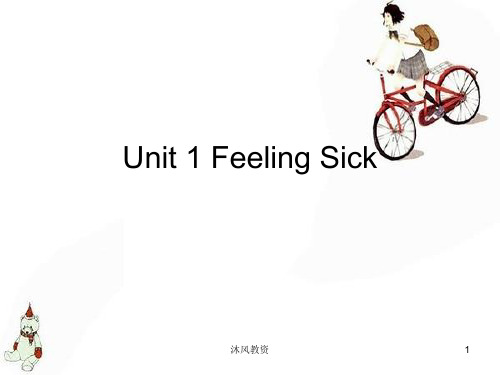
沐风教资
10
沐风教资
11
• We’re looking for a hospital.我们正在找一间医院。 • Where is it?它在哪里? • Go straight to the traffic light.直走到交通灯。 • Turn left at the corner. Cross the street.在拐角处
• Ouch! 噢!
• What wrong, Gogo? Gogo,你怎么啦?
• I hurt my foot. 我的脚受伤了。
• You should see the doctor. 你应该去看医生。
• be动词(am, is, are)+动词ing形式 表示正在
做什么
沐风教资
6
ur / /
• hurt 受伤 • nurse 护士 • purple 紫色 • turn 转向 • Thursday 星期四 • purse 钱包
Unit 1 Feeling Sick
沐风教资
1
have a headache 头痛 have a toothache 牙痛 have a cold 感冒 have a fever 发烧 have a stomachache 肚子痛 take some medicine 服药 see the dentist 去看牙医 stay in bed 躺在床上 them 他们 easy 容易的
沐风教资
8
• 5.What’s the matter______ Gogo? • A. at B. with C. in • 6. You should _______ the dentist. • A. sees B. see C. seeing • 7. I can help ________! • A. they B. them C. than • 8. They ______ a well. • A. digs B. digging C. are digging
完整广东开心英语小学六年级上语法知识Gogo开心学英语版
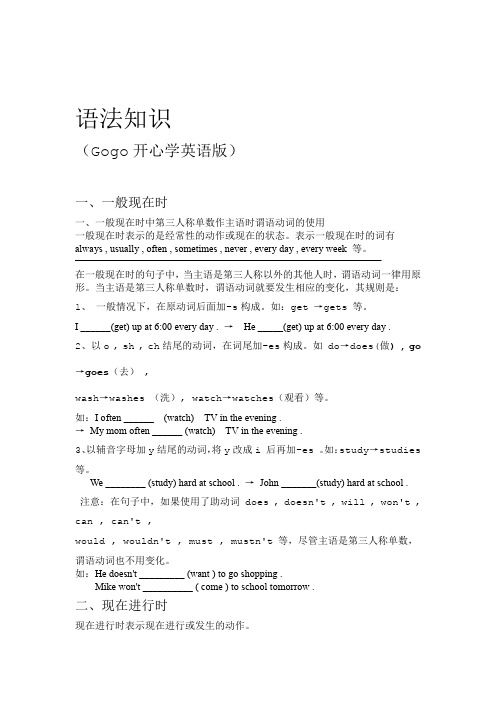
语法知识(Gogo开心学英语版)一、一般现在时一、一般现在时中第三人称单数作主语时谓语动词的使用一般现在时表示的是经常性的动作或现在的状态。
表示一般现在时的词有always , usually , often , sometimes , never , every day , every week 等。
在一般现在时的句子中,当主语是第三人称以外的其他人时,谓语动词一律用原形。
当主语是第三人称单数时,谓语动词就要发生相应的变化,其规则是:1、一般情况下,在原动词后面加-s构成。
如:get →gets 等。
I ______(get) up at 6:00 every day . →He _____(get) up at 6:00 every day .2、以o , sh , ch结尾的动词,在词尾加-es构成。
如 do→does(做) , go →goes(去) ,wash→washes (洗), watch→watches(观看)等。
如:I often ______ (watch) TV in the evening .→My mom often ______ (watch) TV in the evening .3、以辅音字母加y结尾的动词,将y改成i 后再加-es 。
如:study→studies等。
We ________ (study) hard at school . →John _______(study) hard at school .注意:在句子中,如果使用了助动词 does , doesn't , will , won't , can , can't ,would , wouldn't , must , mustn't 等,尽管主语是第三人称单数,谓语动词也不用变化。
如:He doesn't _________ (want ) to go shopping .Mike won't __________ ( come ) to school tomorrow .二、现在进行时现在进行时表示现在进行或发生的动作。
广东开心英语六年级上册全书各单元重点单词、词组和句子复习资料整理.docx

重点单词、词组和句子Unit 1:1 wrote a long letter•重点单词、词组:l.a piece of candy 一块糖2.a carton of ice cream 一亠盒冰淇淋3.a pair of socks 一双袜子4.a bag of chips 一袋薯条5.a bottle of shampoo 一瓶洗发水6.a bar of soap 一块肥皂7.a box of tissues 一盒纸巾8.a roll of toilet paper 一卷手纸9.at 在10.store 商店ll.buy(bought)买12.get(got)买至U13.have(had)有14.bring(brought)带来15.long 长的16.send 寄17.idea 主意Sounds and words:1.chair 椅子2.stairs 楼梯3.bear 熊4.pear 梨5.where 哪里6.there 那里重点句子:(Target)1.Did you buy a bag of chips at the store?你在商店买了一包薯条吗?Yes, I did.是的,我买了No, I didrft.不,我没买。
2.1 bought a bottle of shampoo.我买了一瓶洗发水。
3.OK. I'll go to the store and get a bag of chips・我将/准备去商店买一包薯条。
4.I'm going to get a box of tissues, too.我也将/打算买一盒纸巾。
5」'll go too. I'm going to get a piece of candy!我也将去。
我将/准备买一块糖!难点句了:(Conversation)::LI wrote a long letter.我写了一封长信。
开心英语六年级上册知识点
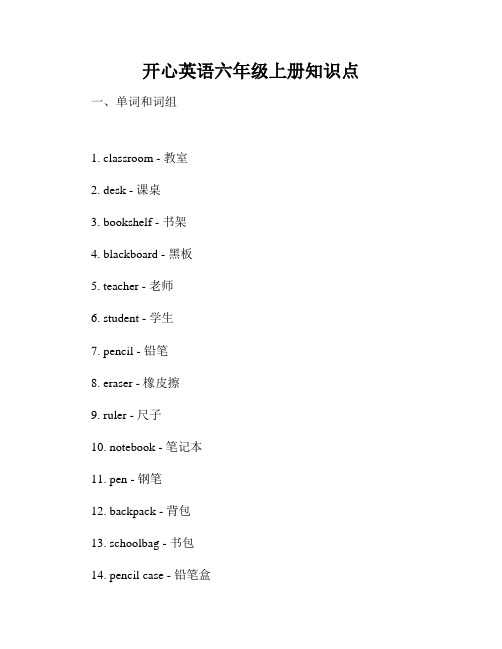
开心英语六年级上册知识点一、单词和词组1. classroom - 教室2. desk - 课桌3. bookshelf - 书架4. blackboard - 黑板5. teacher - 老师6. student - 学生7. pencil - 铅笔8. eraser - 橡皮擦9. ruler - 尺子10. notebook - 笔记本11. pen - 钢笔12. backpack - 背包13. schoolbag - 书包14. pencil case - 铅笔盒15. dictionary - 字典16. lunchbox - 饭盒17. water bottle - 水壶18. computer - 计算机19. map - 地图20. library - 图书馆二、句子和对话1. What's your name? - 你叫什么名字? My name is John. - 我叫约翰。
2. How old are you? - 你几岁?I'm ten years old. - 我十岁。
3. What grade are you in? - 你在几年级? I'm in Grade Six. - 我在六年级。
4. Where do you live? - 你住在哪里?I live in Beijing. - 我住在北京。
5. Do you speak English? - 你会说英语吗?Yes, I do. - 是的,我会说。
6. What's your favorite subject? - 你最喜欢的科目是什么?My favorite subject is Math. - 我最喜欢的科目是数学。
7. What do you do on the weekends? - 周末你做什么?I usually play soccer with my friends. - 我通常和朋友踢足球。
最新版开心学英语六年级(上册)复习知识点整理
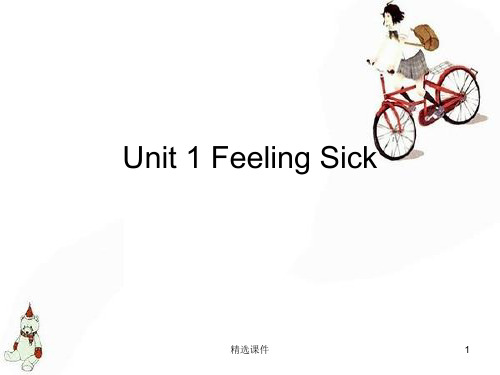
精选课件
2
• What’s wrong with you? 你怎么啦? • I have a headache 头痛 have a toothache 牙痛 have a cold 感冒 have a fever 发烧 have a stomachache 肚子痛
精选课件
3
What’s wrong with him/her/Tony?
精选课件
9
Unit 2 Looking for a Hospital
• turn left 向左转 • turn right 向右转 • go straight 直走 • across from 在……对面 • street 街道 cross 穿过 • corner 拐角 find 找到 • traffic light 交通灯 please 请 • bus stop 公共汽车站
• Ouch! 噢!
• What wrong, Gogo? Gogo,你怎么啦?
• I hurt my foot. 我的脚受伤了。
• You should see the doctor. 你应该去看医生。
• be动词(am, is, are)+动词ing形式 表示正在
做什么
精选课件
6
ur / /
• hurt 受伤 • nurse 护士 • purple 紫色 • turn 转向 • Thursday 星期四 • purse 钱包
• Turn left at the corner. It’s next to the supermarket.在拐角处向左转。它紧挨着超 级市场。
精选课件
11
• We’re looking for a hospital.我们正在找一间医院。 • Where is it?它在哪里? • Go straight to the traffic light.直走到交通灯。 • Turn left at the corner. Cross the street.在拐角处
开心学英语版六年级上册知识点整理
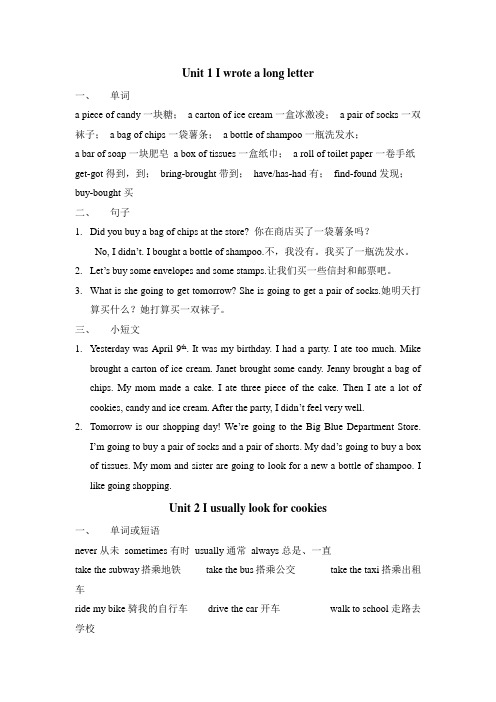
Unit 1 I wrote a long letter一、单词a piece of candy一块糖;a carton of ice cream一盒冰激凌;a pair of socks一双袜子;a bag of chips一袋薯条; a bottle of shampoo一瓶洗发水;a bar of soap一块肥皂a box of tissues一盒纸巾;a roll of toilet paper一卷手纸get-got得到,到;bring-brought带到;have/has-had有;find-found发现;buy-bought买二、句子1.Did you buy a bag of chips at the store? 你在商店买了一袋薯条吗?No, I didn’t. I bought a bottle of shampoo.不,我没有。
我买了一瓶洗发水。
2.Let’s buy some envelopes and some stamps.让我们买一些信封和邮票吧。
3.What is she going to get tomorrow? She is going to get a pair of socks.她明天打算买什么?她打算买一双袜子。
三、小短文1.Yesterday was April 9th. It was my birthday. I had a party. I ate too much. Mikebrought a carton of ice cream. Janet brought some candy. Jenny brought a bag of chips. My mom made a cake. I ate three piece of the cake. Then I ate a lot of cookies, candy and ice cream. After the party, I didn’t feel very well.2.Tomorrow is our shopping day! We’re going to the Big Blue Department Store.I’m going to buy a pair of socks and a pair of shorts. My dad’s going to buy a box of tissues. My mom and sister are going to look for a new a bottle of shampoo. I like going shopping.Unit 2 I usually look for cookies一、单词或短语never从未sometimes有时usually通常always总是、一直take the subway搭乘地铁take the bus搭乘公交take the taxi搭乘出租车ride my bike骑我的自行车drive the car开车walk to school走路去学校by bus/by bike/by car….by短语放在句尾二、句子1、How do you get to school? I usually take the bus.2、How does she get to work? She usually take the subway.3、How do they get to school? They always walk to school.4、Do you ever take a taxi to school?No, I don’t. I never take a taxi to school.5、Here we are. Let’s look for some insects.6、I think we’re lost. But I found some cookies.Unit 3 How often do you go hiking?一、单词及短语Once一次;twice两次;three times三次;go fishing钓鱼;go dancing去跳舞;go hiking去远足;go ice-skating去滑冰;go swimming去游泳。
广东开心英语六年级上册知识点汇总
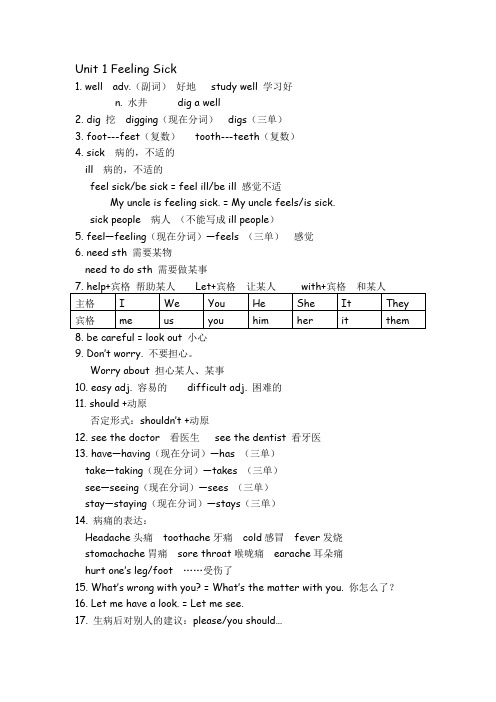
Unit 1 Feeling Sick1. well adv.(副词)好地study well 学习好n. 水井dig a well2. dig 挖digging(现在分词)digs(三单)3. foot---feet(复数)tooth---teeth(复数)4. sick 病的,不适的ill 病的,不适的feel sick/be sick = feel ill/be ill 感觉不适My uncle is feeling sick. = My uncle feels/is sick.sick people 病人(不能写成ill people)5. feel—feeling(现在分词)—feels (三单)感觉6. need sth 需要某物need to do sth 需要做某事8. be careful = look out 小心9. Don’t worry. 不要担心。
Worry about 担心某人、某事10. easy adj. 容易的difficult adj. 困难的11. should +动原否定形式:shouldn’t +动原12. see the doctor 看医生see the dentist 看牙医13. have—having(现在分词)—has (三单)take—taking(现在分词)—takes (三单)see—seeing(现在分词)—sees (三单)stay—staying(现在分词)—stays(三单)14. 病痛的表达:Headache头痛toothache牙痛cold感冒fever发烧stomachache胃痛sore throat喉咙痛earache耳朵痛hurt one’s leg/foot ……受伤了15. What’s wrong with you? = What’s the matter with you. 你怎么了?16. Let me have a look. = Let me see.17. 生病后对别人的建议:please/you should…○1see the doctor/dentist○2take some medicine○3stay in bed/get lots of sleep○4get some rest/have a rest○5drink a lot of water/drink more water18. have a rest=rest 休息Have a good rest 好好休息19. a lot of= lots of 大量的20. go to the dentist = see the dentist = go to see the dentist21. How are you feeling? = How do you feel? 你感觉怎么样?22. You are right. 对的You are wrong. 错得23. so many+可数名词复数so many candiesso much+不可数名词so much cola24. have a bad cold 得重感冒25. have a high fever 发高烧26. get—getting(现在分词)—gets (三单)27. get better 变好Good 好的better 更好的Unit2 Looking for a hospital1. busy 忙碌的2. look for 寻找look after 照顾look at 看着look out 小心3. Be careful, Gogo! = Watch out, Gogo! =Look out, Gogo!4. Cross = go across 穿过Cross the street. = Go across the street. = Walk across the street.5. bus stop 公交站(临时停车)bus station 汽车站(总站)train station 火车站airport 机场6. street 街道road 马路7. I know. = I see. 我知道了。
广东开心版英语六年级上册各单元学习重点
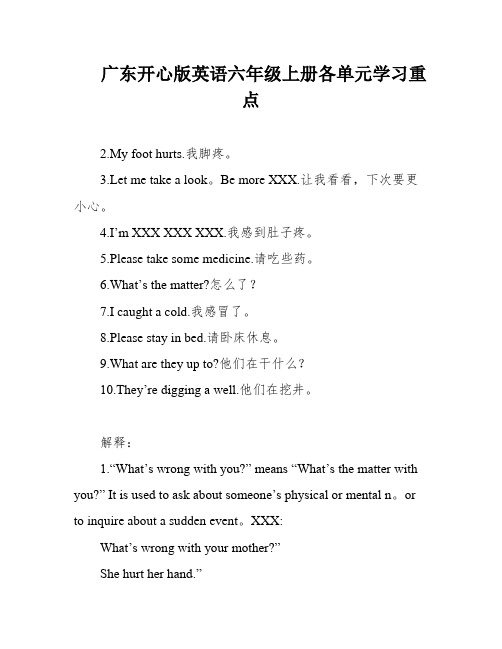
广东开心版英语六年级上册各单元学习重点2.My foot hurts.我脚疼。
3.Let me take a look。
Be more XXX.让我看看,下次要更小心。
4.I’m XXX XXX XXX.我感到肚子疼。
5.Please take some medicine.请吃些药。
6.What’s the matter?怎么了?7.I caught a cold.我感冒了。
8.Please stay in bed.请卧床休息。
9.What are they up to?他们在干什么?10.They’re digging a well.他们在挖井。
解释:1.“What’s wrong with you?” means “What’s the matter with you?” It is used to ask about someone’s physical or mental n。
or to inquire about a sudden event。
XXX:What’s wrong with your mother?”She hurt her hand.”2.“You should see the doctor” means that it is mended to go to the doctor for medical n.3.“My foot hurts” means that there is pain in the foot.4.“Let me take a look。
Be more careful next time” means that XXX injury。
and reminds the person to be more careful in the future.5.“I’m XXX” means that there is XXX.6.“XXX?” is another way to ask about XXX.7.“I caught a cold” means that someone has a cold or is experiencing cold-XXX.8.“Please stay in bed” is a XXX.9.“What are they up to?” is a way to ask about XXX.10.“They’re digging a well” means that they are digging a hole in the ground to access water.在问路时,询问某个地点的位置,常用句型为“Whereis/are + 地点?”3.Go XXX.直走,它在公园对面。
最新广东版开心学英语六年级上册知识点整理
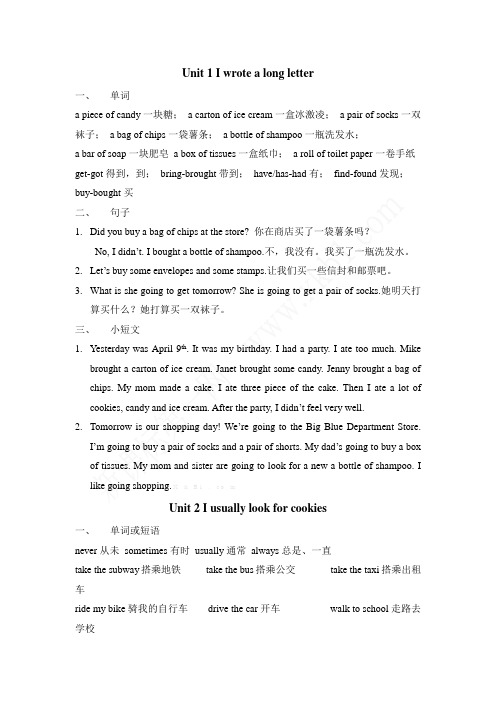
Unit 1 I wrote a long letter一、单词a piece of candy一块糖;a carton of ice cream一盒冰激凌;a pair of socks一双袜子;a bag of chips一袋薯条; a bottle of shampoo一瓶洗发水;a bar of soap一块肥皂a box of tissues一盒纸巾;a roll of toilet paper一卷手纸get-got得到,到;bring-brought带到;have/has-had有;find-found发现;buy-bought买二、句子1.Did you buy a bag of chips at the store? 你在商店买了一袋薯条吗?No, I didn’t. I bought a bottle of shampoo.不,我没有。
我买了一瓶洗发水。
2.Let’s buy some envelopes and some stamps.让我们买一些信封和邮票吧。
3.What is she going to get tomorrow? She is going to get a pair of socks.她明天打算买什么?她打算买一双袜子。
三、小短文1.Yesterday was April 9th. It was my birthday. I had a party. I ate too much. Mikebrought a carton of ice cream. Janet brought some candy. Jenny brought a bag of chips. My mom made a cake. I ate three piece of the cake. Then I ate a lot of cookies, candy and ice cream. After the party, I didn’t feel very well.2.Tomorrow is our shopping day! We’re going to the Big Blue Department Store.I’m going to buy a pair of socks and a pair of shorts. My dad’s going to buy a box of tissues. My mom and sister are going to look for a new a bottle of shampoo. I like going shopping. X k B 1 . c o mUnit 2 I usually look for cookies一、单词或短语never从未sometimes有时usually通常always总是、一直take the subway搭乘地铁take the bus搭乘公交take the taxi搭乘出租车ride my bike骑我的自行车drive the car开车walk to school走路去学校by bus/by bike/by car….by短语放在句尾二、句子1、How do you get to school? I usually take the bus.2、How does she get to work? She usually take the subway.3、How do they get to school? They always walk to school.4、Do you ever take a taxi to school?No, I don’t. I never take a taxi to school.5、Here we are. Let’s look for some insects.6、I think we’re lost. But I found some cookies.Unit 3 How often do you go hiking?一、单词及短语Once一次;twice两次;three times三次;go fishing钓鱼;go dancing去跳舞;go hiking去远足;go ice-skating去滑冰;go swimming去游泳。
- 1、下载文档前请自行甄别文档内容的完整性,平台不提供额外的编辑、内容补充、找答案等附加服务。
- 2、"仅部分预览"的文档,不可在线预览部分如存在完整性等问题,可反馈申请退款(可完整预览的文档不适用该条件!)。
- 3、如文档侵犯您的权益,请联系客服反馈,我们会尽快为您处理(人工客服工作时间:9:00-18:30)。
Unit 1 Feeling Sick 感觉不舒服
句子详解:
1. What’s wrong with you? 你怎么了?
“What’s wrong with…?”意思是“......怎么了?”用来询问身体或精神状态,也可以用来询问突发事件,表示关心或问候。
同义句是“What’s the matter with…?”with是介词,后面要加名词或代词的宾格形式。
如:
---“What’s wrong with your mother? 你妈妈怎么了?
---She hurts her hand. 她伤着手了。
2. You should see the doctor. 你应该看医生。
should 是情态动词,没有人称和数的变化,后面加动词原形,句型结构:(1)肯定句:主语+ should +动词原形+其他。
(2)否定句:主语+ shouldn’t + 动词原形+其他。
(3)一般疑问句:Should + 主语+ 动词原形+ 其他?
He should stay in bed.
He shouldn’t stay in bed.
Should he stay in bed?
Unit 2 Looking for a hospital 找医院
句子详解:
1. Excuse me.对不起/打扰了/请原谅。
【辨析】Excuse me. 与Sorry.
“Excuse me. ”和“Sorry.”是日常会话中使用频率较高的口语,它们都可译为“对不起”。
“Excuse me. ”用来引起别人注意,也可表示礼貌,意为“对不起;请问;打扰了;劳驾”等,它是在给别人添麻烦之前说的话,是最普通的道歉用语。
“Sorry.”(=“I’m sorry.”通常用于表示由于某种过失或办不成某事的一种歉意。
2.Where’s the hospital?医院在哪里?
Where 意思是“在哪里”,常用来询问位置或地点。
当我们想要去某地却不知道地点时可以用句型“Where’s+ 地点?”来询问,回答时通常用“It’s +位置介词+参照地点.”如:
---Where is the bookstore?
---It’s next to the post office.
Unit 3 Staying Healthy 保持健康
短语详解:
1.too much 太多的
Too much cola is bad for you.太多可乐对你有坏处。
【辨析】too much 和too many
too much后面加上不可数名词。
如:There is too much water here. 这里有太多的水。
too many后面加可数名词复数。
如:There are too many people in the bus.公共汽车上有太多的人。
Unit 4 Keeping Clean保持干净
句子详解:
What was your bedroom like this morning? 今天早上你的卧室怎么样?
What+ be 动词+主语+like…?意思是“…什么样?”用来询问人或物的外在特征或人的性格特点等。
Like 在这里作介词,意思是“…怎么样”。
当询问人或物过去的特征时be动词要用was/were。
如:
---What was the weather like?
--- It was cool.
---What were your shoes like?
--- They were clean.
Unit 5 A circus in the Park 公园里的马戏团
语音详解:
句子详解:
1.Where were you yesterday? 昨天你在哪里?
这是含有be 动词的一般过去时的特殊疑问句,where 意思是“哪里“,用来询问过去在哪里。
回答时用“主语+was/were+地点。
”如:
---Where was he last night? 昨天晚上他在哪里?
---He was at home. 他在家里。
---Where were Jenny and Tony yesterday? 昨天Jenny 和Tony 在哪里?
---They were in the circus park.
Unit 6 Planting Trees 植树
语音详解:
ed发音口诀:清辅音念/ t /
元浊辅音念/ d/
td之后念/id/。
